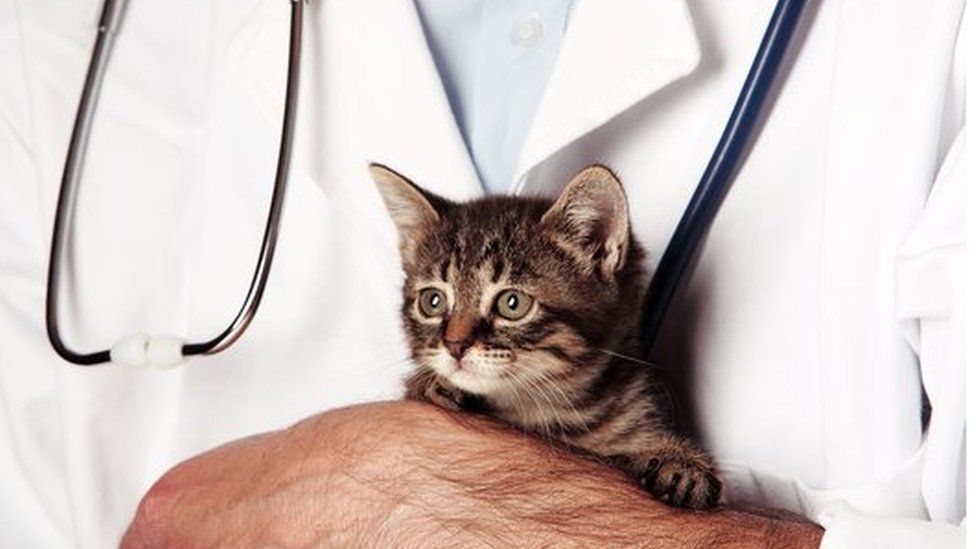Vets: Ban the use of homeopathy in animals
- Published

About 1,000 of the UK's vets have signed a petition calling for a ban on homeopathy being prescribed to animals.
The petition calls on the Royal College of Veterinary Surgeons to stop vets from offering homeopathy on animal welfare grounds.
But the veterinary regulator says "it is difficult to envisage any justification" for a ban.
About one in seven practices offers some form of complementary therapy.
Figures suggest about 500 farmers and 40 vets are trained in homeopathy.
Danny Chambers, the Devon vet who started the petition on Change.org, said it had been signed by more than 1,000 British vets as well as others from around the world.
There are some 22,000 vets in the UK.
"We think vets these days should be offering 21st Century medicine," he told BBC News.
"It's been shown that homeopathy doesn't work, so it probably shouldn't be offered any more even if it is offered with good intentions."
According to Mr Chambers, prescribing homeopathy is an animal welfare issue and fails to meet the standard required for scientific veterinary practice.
"A veterinary surgeon should have an accredited degree from an accredited university, and they shouldn't be using treatments that have been disproven," he said.
"Animal welfare undoubtedly suffers if people give homeopathy instead of proper treatment."
The Royal College of Veterinary Surgeons, which regulates the veterinary profession, says it recommends "a cautious approach to homeopathy for animals".
In response to the petition - due to be submitted on Friday - it said given demand for complementary therapies it was better clients sought advice from a veterinary surgeon - who was qualified to make a diagnosis, and could be held to account for the treatment given - rather than turning to a practitioner with no veterinary training.
The statement added: "Furthermore, homeopathy is currently accepted by society and recognised by UK medicines legislation, and does not, in itself, cause harm to animals.
"While this is the case, it is difficult to envisage any justification for banning a small number of veterinary surgeons from practising homeopathy."
Homeopathy
Homeopathy is based on the use of highly diluted substances, which practitioners say can cause the body to heal itself.
A 2010 House of Commons Science and Technology Committee report on homeopathy said the remedies performed no better than placebos and that the principles on which homeopathy was based were "scientifically implausible".
According to NHS guidelines, there "is no good-quality evidence that homeopathy is effective as a treatment for any health condition".
Supporters of homeopathy in animals say that the evidence base supporting the effectiveness of the therapy is growing.
Source: Homeopathy - NHS Choices
Mark Elliott is a qualified vet and veterinary homeopath in West Sussex and a past president of the British Association of Homeopathic Vets.
He told BBC News: "As a veterinary surgeon, my role and what I am charged to do by my clients is to do the best I can for my patients.
"And if that involves using homeopathy to achieve a benefit for that patient - having seen literally thousands upon thousands of cases over my career respond well - then that to me is actually a critical appraisal of the evidence that's in front of my eyes."
He added: "If you have qualified, regulated people who understand the medical processes of the day and can objectively assess the case and determine which is the treatment for that particular case, is that not a better thing?"
"Because if you ban homeopathy through veterinary surgeons, it will only go underground."
Organic farming
Homeopathy is sometimes used by organic farmers, such as for cows with mastitis.
In May, Prince Charles, speaking at a summit on antibiotic resistance, said he was successfully using homeopathy on animals at his organic farm.
The organic food charity, the Soil Association, said the use of homeopathy was an individual decision for farmers and not mandatory for organic status.
"For all complementary therapies, our standards specify that they are used with professional veterinary guidance and provided that their healing effect works for the species and condition you are treating," said policy director, Peter Melchett.
Follow Helen on Twitter.